
and
February 2021 2020: The year we all went home How life has changed at Swinburne Maddison Weathering the storm Interviews with clients and professional partners Rebuilding your business for success in 2021 Top tips for future growth
News
views from
03 Welcome
Partner and Practice Manager, Carolyn Beal, introduces us to the latest news and insights.
04 - 05 Ask the Expert

Jonathan Moreland provides an Employment Law COVID-19 update.
06 Game On
Our Corporate team round off 2020 with the sale of a games design business to a Swedish company.
07 Three Questions
Nadine Walton explains what being a Private Client lawyer means to her.
08 - 09
What a year!
A look behind the scenes of Swinburne Maddison - the year we all went home.
10 -12
Weathering the Storm that was 2020
Four influential local figures reflect on their experiences of 2020 and share their hopes for the future. 13 More Legal 500 success for Swinburne Maddison
We celebrate rankings in seven categories for 2021. 14 -15 From strength to strength
Continuing to thrive despite the challenges of last year.
16
-17
Our Family Team
Getting to know Kath Hill, Catherine Lowther and Natalia Lalas. 18 -19
Rebuilding your business to succeed
How to conduct a legal health check and tips for bouncing back in 2021. 20 NE businesses supported by Open North Foundation
How Open North Foundation has helped local businesses to recover from the devastating impact of COVID-19.
21 Commercial Landlords and Rent Arrears
David Low summarises the legal position for commercial landlords who have been unable to recover rent arrears during the pandemic.
22 - 23
Interview with Ramside Hall Estates, John Adamson
John Adamson discusses the impact of 2020 on the hospitality sector and his exciting plans for the future.
2 swinburnemaddison.co.uk
Contents
Welcome to

Welcome to our third instalment of Prism, Swinburne Maddison’s very own publication bringing you the latest news and insights from our team, clients and the organisations we work with.
After the year we have all just experienced, it will come as no surprise that there is one particular theme which weaves its way through many of the stories to follow.
Naturally, it has been a very unusual and challenging year for all of us at Swinburne Maddison – as it has been for many businesses – and we are very privileged that some of our longest-standing clients have agreed to lift the curtain on their experiences of the past 12 months and share some of the specific challenges which their organisations have had to overcome.
We are all aware that some industries and sectors continue to feel the impact of the pandemic more acutely than others and John Adamson, Managing Director of Ramside Estates, has also returned to share some of his insights on the current state of the hospitality sector and his hopes for the future.
Thankfully, there have also been glimmers of hope and reasons to be cheerful during this strange year. As a firm, we have remained extremely busy thanks to some exciting development plans in the whole north eastern region that we continue to be heavily involved in and a stronger than expected rebound in M&A activity, and we were delighted to welcome a new recruit to our growing Dispute Resolution team (the first of several, we hope!)
Our team have also been working hard to prevent our clients from becoming overwhelmed by the continuous raft of legislative updates and guidelines which have been rolled out by the Government since March – particularly in the areas of Employment Law and Housing – delivering topical webinars and preparing regular e-bulletins and articles to ensure that clients are kept abreast of the latest developments.
It goes without saying that we are incredibly proud of our team and the way they have pulled together throughout our toughest year yet, working tirelessly to keep our high service levels in
place for clients whilst adapting to new and ever-changing work patterns. We’re very lucky to have them!
I know better than to try and make any predictions for the coming months but there is certainly a lot to feel hopeful about as we look forward to the year ahead. Here’s to a better and brighter 2021 for all of us. Stay safe everyone.
Carolyn Beal, Partner and Practice Manager

3 swinburnemaddison.co.uk
Ask the Expert Employment Law COVID-19 Update: Your questions answered
by Jonathan Moreland, Partner and Head of the Employment team


Employers are entitled to ask for “reasonable evidence” of incapacity (usually a doctor’s fit note) after the first seven days of any sickness absence.
In cases where the absence relates to COVID-19, the government has confirmed that any of the following would constitute sufficient evidence of sickness for Statutory Sick Pay purposes:
An isolation note from NHS 111 if they are self-isolating and cannot work because of COVID-19.
The notification from the NHS or public health authorities if they are self-isolating because they have come into contact with someone with COVID-19.
A fit note as normal.
The NHS or GP letter telling them to stay at home (shield) for at least 12 weeks because they are at high risk of severe illness from COVID-19.
This should be a straightforward one to resolve it if is possible for the employee to work from home (see next page). If not, it will be necessary for the employer to consider: the current public health advice; the specific reason that the employee is concerned about attending work; and whether it would be discriminatory to refuse home working, take disciplinary action, or withhold pay in light of the employee’s refusal.
If the employer is satisfied that there is no discrimination angle, and there is no reasonable justification – backed up by the public health advice – for the employee to refuse to attend work, then there may be a case for initiating a misconduct investigation.
However, employers should always take time to carefully consider the context of the refusal to work before any disciplinary action is taken. Certain dismissals related to the raising of health and safety concerns amount to automatically unfair dismissals which do not require qualifying service. Even action short of dismissal on these grounds could amount to a detriment which is unlawful.
4 swinburnemaddison.co.uk
1 What evidence can an employer require in relation to COVID-19 related absences?
2 Where an employee refuses to attend work due to fears about COVID-19, what can an employer do?
Following the announcement of the national lockdown on 4th January 2021, the current position in England is that individuals should only attend their workplace when they cannot reasonably work from home. Employers should take “every possible step” to facilitate their employees working from home, including providing suitable IT and equipment to enable remote working.

Where it is not possible for employees to work from home e.g. construction workers and public-sector employees working in essential services, they should continue to travel to their workplace where necessary.
Clinically extremely vulnerable employees who cannot work from home should not attend work.
The current government guidance states that employers who require workers to take holiday during furlough or a period of lockdown must consider any restrictions that the employee is under, including the need to self-isolate or socially distance. These considerations must be viewed alongside the fundamental purpose of holiday, which is to rest, relax and enjoy annual leave.
Of course, a person’s opinion of what constitutes a restful break is completely subjective and it is difficult for an employer to assess what would or would not amount to preventing an employee
from relaxing and enjoying their annual leave in accordance with the requirements of the Working Time Directive.
That said, it may be arguable that a restrictive form of lockdown which puts workers in effectively the same position as people who are subject to self-isolation, is an example of a period during which it is not possible to enjoy rest and relaxation and that employers should, therefore, allow workers to reschedule holiday during this period.
It is not currently mandatory, at a legislative level, for any individual to be vaccinated so it would be risky for employers to insist on vaccination, even in workplaces where there is close contact with vulnerable people. The ACAS guidance advises that employers should support staff in getting the vaccine, but cannot force them to be vaccinated, although it acknowledges that it may be necessary to make vaccination mandatory where it is required for someone to do their job e.g. where they travel overseas.
This is clearly a very delicate issue, requiring careful communication with employees and full consideration of the possible consequences if you choose to proceed down this route. There could, for instance, be a myriad of potential discrimination issues to navigate, bearing in mind that the available vaccines will
not be suitable for everyone, due to individual circumstances such as health conditions, dietary issues, religious objections to name but a few. There is also the possibility that employers could find themselves on the receiving end of a personal injury claim if an employee, who they had compelled to obtain the vaccine, suffers an adverse reaction.
In view of the risks of a mandatory vaccination programme, it is advisable for employers to consider how best to achieve voluntary vaccination within their workforces. Collective consultation with employee or trade union representatives in addition to a sensitive internal communications plan may contribute towards voluntary take-up of the vaccine.
swinburnemaddison.co.uk 5
3
Should an employer allow an employee to work from home?
4 Can an employer require an employee to take holidays during lockdown?
5 Can an employer require an employee to be vaccinated?
GAME ON
CORPORATE TEAM CONCLUDES SALE OF GAMES BUSINESS TO SWEDISH BUYER.
Our Corporate team was delighted to round off 2020 with the sale of Silent Games, a game design studio in Newcastle to Amplifier Game Invest AB (Amplifier), for an undisclosed sum.
Amplifier is a subsidiary of the listed Swedish Embracer Group, the acquisition of Silent Games being one of 12 such global transactions recently completed by the Group and announced to the Swedish stock market simultaneously.
Silent Games was founded in 2018 by Sally Blake and Joseph Rogers, experienced developers and mentors within the British game development sector. The acquisition should see the expansion of Silent Games to a team of 30 or so from its current four employees over the next year. It is Amplifier’s first investment in the UK, which is viewed as one of the world’s strongest hubs for game development.
Selected by Silent Games after speaking to other law firms, our Corporate team successfully turned the sale around in just three weeks.
Leading the transaction for Swinburne Maddison was Alex Wilby, a Partner in the Corporate team, who is highly experienced in mergers and acquisitions as well as regularly working with ownermanaged businesses. He said: “We were delighted to be selected by Joseph
and Sally to undertake the sale for them. They established the business only two years ago, so it was a marvellous opportunity for them to become part of a gaming giant like Amplifier.
“Amplifier is part of a highly acquisitive multinational company, Embracer Group, who employ almost 4,500 staff globally and whose total number of games currently under development stands at 135.
Embracer was in the process of completing several other deals when we were appointed so it was essential to be able to complete the work at pace. Embracer needed to make a regulatory release to the Swedish stock market by a tight deadline and I’m pleased to report that all deadlines were hit without fail.
It demonstrates that we can provide the technical and broad-based legal expertise that is essential for the successful and swift completion of a wide range of mandates and we enjoy the challenging high-quality legal work they generate.”
Commenting on the sale, Director Joseph Rogers, said:
“ We spoke to several law firms before deciding on Swinburne Maddison, the deciding factor being Alex Wilby’s immediate understanding of our position and the nature of the transaction. They went out of their way to reassure us on costs too, but I felt huge confidence in the team, which were absolutely great to work with, happy to work long hours on our behalf and very much on the ball. We would definitely work with them again should the need arise.”
Speaking about the acquisition, Per-Arne Lundberg, CEO of Amplifier Game Invest, described Silent Games as being exactly the kind of company that he likes to support because of the team’s creativity, its strong production background, its passion for engagement and its close links with the local game development community.

6 swinburnemaddison.co.uk
L-R Sophie Allerton, Solicitor, and Alex Wilby, Partner, of Swinburne Maddison LLP with Sally Blake and Joseph Rogers, founders of Silent Games.
YOUINCASEMISSEDIT
Joseph added:
“It was a huge turning point for us selling the business as we have been a small team for over two years and our output has been limited to creative concepts with very little development work. Now, we are ramping up the team to 10 people immediately and looking to go up to about 15 by the end of 2021 with even more growth planned in the future.
Our future focus will be on developing the games concepts that we have spent so much time conceiving in the past and we couldn’t be more excited at the prospect of releasing these to the public.
With Amplifier’s backing it not only means more jobs for regional developers, but a boost to the regional economy. As Amplifier’s first investment in the UK, if it pays off, which only time will tell, then they will definitely be interested in expanding further here.”
Three Questions
Nadine Walton, Managing Associate, Private Client team

1Where did you study law and why did you want to become a lawyer?
I completed my law degree at Newcastle University, then undertook the Legal Practice Course (LPC) at BPP in Leeds. Before I embarked on the LPC, I had some time out and was actually really uncertain as to whether to take the plunge and enter the legal profession. The LPC convinced me that I had the skills to be able to provide a valuable service to clients, and also piqued my interest in Private Client work. I’m pleased that I stuck with it!
2 Why did you want to specialise in Private Client?
When exposed to Private Client work during my training contract, I realised quickly that this is an area of law which is very intellectually stimulating – with scope for further specialist training and development if you want it – but that it’s not enough to rely on technical skill alone. There’s a constant need to complement those skills with equally strong interpersonal ones and this was something which really interested me.
Every client’s circumstances are slightly different, they’re motivated by various drivers, and you must take the time to listen and understand these before you get to work on planning and drafting. Then comes the technical challenge of completing the legal work to meet their requirements, always ensuring they’re kept fully abreast of the process by providing clear and comprehensive advice. I enjoy employing my analytical skills and working hard to provide a tailored, understanding service to clients, in the hope that I do deliver a service of real value for them.
3
What has been your greatest achievement at Swinburne Maddison?

It’s a bit of a catch-all, I appreciate, but I have to say that I’m most proud of the time and energy I spent developing my skills and qualifications during the early part of my career. This means I’m now fully-equipped to manage a complex and varied caseload and provide a high-quality, specialist service to all my clients.
I’ve been so lucky to have the firm support me through the STEP (Society for Trust and Estate Practitioners) qualification and to continue supporting and encouraging me as I begin my new role as Managing Associate.
However, the quietest sense of pride I nurture is probably felt when clients actually feed back that they’re pleased with my work and that it has made a real difference to them. The comments I received this year in The Legal 500 gave me a real sense of achievement for that reason.
7 swinburnemaddison.co.uk
2020: The year we all went home
For our fee earners, the transition to working from home was reasonably straightforward – many of them had been enjoying the benefits of our agile working programme for some time anyway, and were fully set up for remote working. But it’s a credit to everyone involved (especially our Office Manager and all-round logistics wizard, William Dobson) that our entire team – partners, fee earners and support staff alike – all had full access to our IT and communications systems from Day 1 of logging in at home.

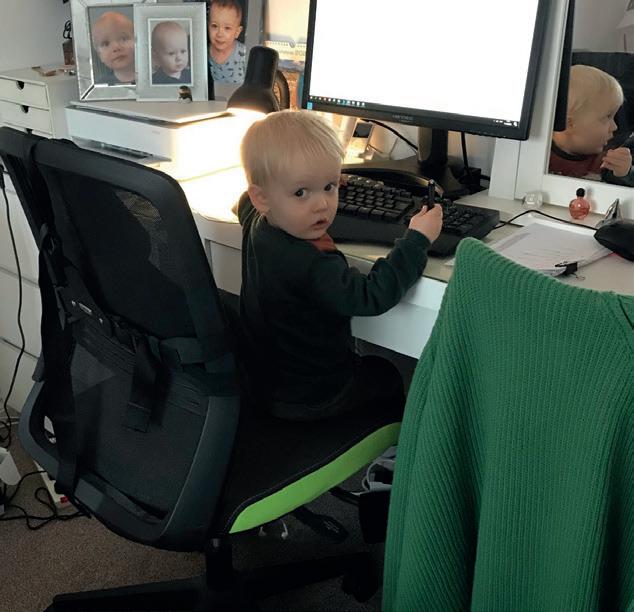
Of course, technical issues are just the tip of the iceberg when it comes to the trials of working from home during a pandemic. There’s home-schooling (the less said about that the better), the struggle to retain a work/life balance when the lines between the two are becoming increasingly blurred, and of course the lure of a well-stocked fridge. But for all of us at Swinburne Maddison, one of the toughest challenges has been missing our beautiful office and not being able to see our friends and colleagues every day. When we redesigned our office space back in 2017, we took great care to create an open plan workspace where all of our teams could sit together and work collaboratively; sharing ideas and supporting each other in their work. We miss that a lot.
Of course, we haven’t all been at home the entire time. During the latter half of 2020, many of our staff enjoyed a small taste of “normality” when each team took turns to attend the office on a rota basis. Hopefully it won’t be too much longer before we’re doing that again. Until then, we’ll continue to find ways to keep our spirits up and get through this last stretch with our usual good humour.
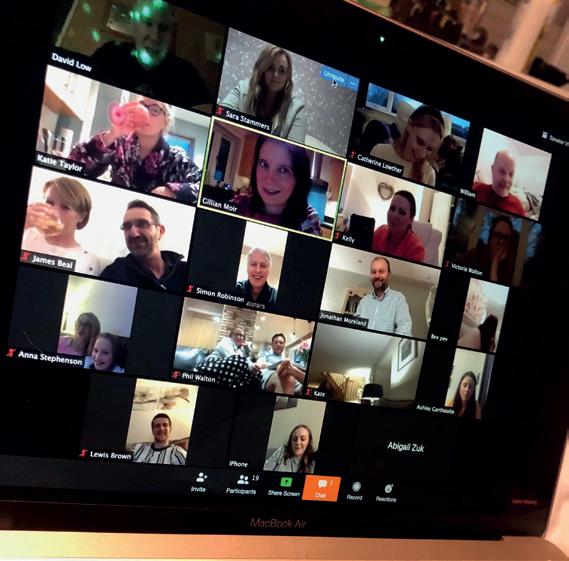

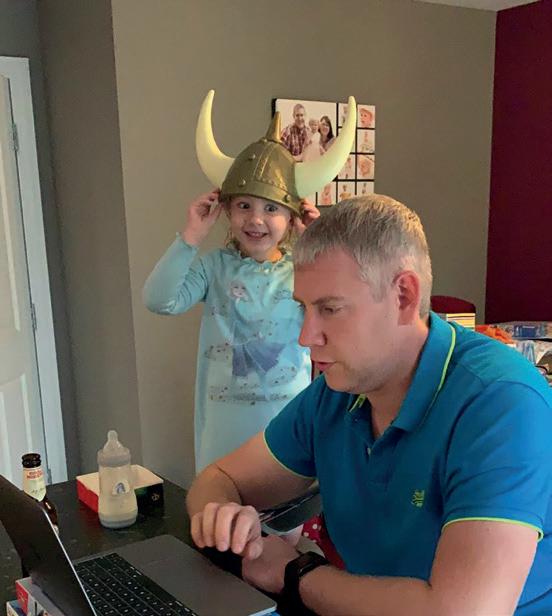
To look back on the last 11 months and reflect on what we have achieved as a firm – as a group of people – is really nothing short of amazing. Going from a business which operated from one fixed location in Durham City to one where every one of its 55 staff members was working remotely all across the North East, was a technical and logistical feat like nothing we’ve ever experienced.
Also, let’s not forget the positives – there have been treat packages, Christmas hampers and a weekly Zoom quiz with just the right amount of competitive edge – and, for some of us, it has actually been quite a nice opportunity to be able to spend more quality time with our tiny terrors and four-legged friends, even if they don’t always make the most considerate work colleagues…
8 swinburnemaddison.co.uk
If anyone had told us in March last year that almost all of our workforce would still be working from home 11 months on, we’d have had a hard time believing them. And yet here we are!
Covid-Secure offices

On the list of the things you never expected you would have to do in your workplace, applying elephant feet stickers to the carpet, at intervals of 2 metres has to be up there!
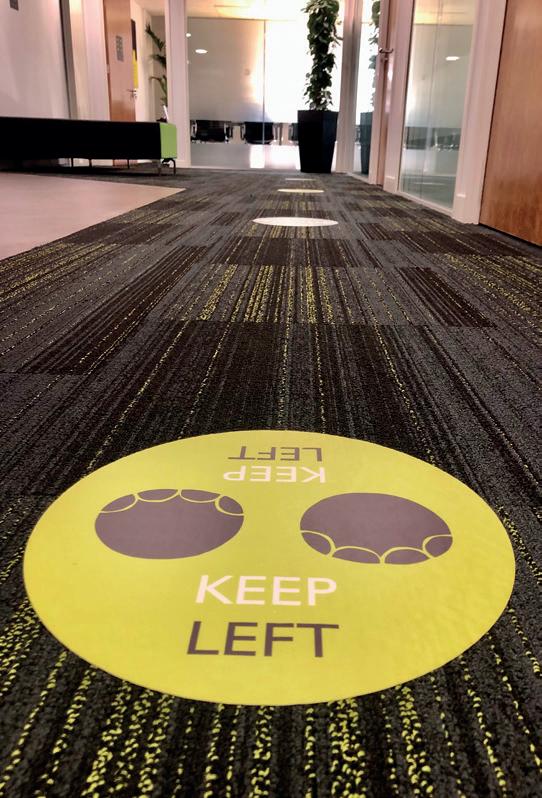
Over the course of 2020 we introduced a range of new systems and measures – from wall-mounted hand sanitisers and a plexiglass screen at Reception, to strict occupancy limits in our meeting rooms and an enhanced cleaning regime – to ensure that staff and visitors would feel completely at ease when attending the office.

We can’t wait to welcome back more members of our team, and clients, as soon as it is safe to do so.

Thank you
We would like to take this opportunity to say an enormous thank you to all of our clients and friends of the firm for your continued support and understanding this past year. It is never taken for granted.
And to every single member of our team who have shown incredible patience and fortitude since this all began 11 months ago, you really are the best of the best. We have asked a lot of you all this year and you have risen to the challenge at every turn.
It is thanks to this unwavering support – from all sides – that we begin 2021 on a strong footing, ready to welcome some new faces, and excited to join other businesses in the effort to get the North East back on the road to economic recovery.
9 swinburnemaddison.co.uk
Weathering the storm
of colleagues, we have also had the challenge of putting all of our twice-daily services on-line so that people can continue to worship remotely. Since the start of the pandemic, we’ve had almost 3 million minutes of viewing, with some of our Christmas services being seen by 30,000 people. Rather wonderfully, we now have far more people joining us for the daily services!
What steps (if any) were you able to take to overcome this?
I am blessed with a fantastic team here with significant operational and professional skills across logistics, HR, finance, buildings, commerce and conservation, as well as all the other specialisms in music and worship you would expect at a cathedral. However, we’ve faced similar issues to others – a serious downturn in visitor numbers and income, while still carrying core (non-furlough) costs. Our Development Team have been incredibly successful in securing support funding, including a £1.9m grant from the Culture Recovery Fund to assist the cathedral in the process of stabilisation, recovery and restructure.
What are your hopes for the year ahead?
Andrew Tremlett, Dean of Durham Cathedral

What was the biggest challenge for the Cathedral in 2020?
It goes without saying that the pandemic has been the biggest challenge for every business and organisation, and Durham Cathedral is no exception. Apart from all the logistical issues in moving swiftly to lockdown and furloughing a good number
Durham Cathedral has used the pandemic to undertake a programme we’ve called ‘Resurrection, not Resuscitation’: that’s to say, we don’t want to emerge from this period simply repeating what we were doing before, but rather we want to work in a more agile, transparent and focussed way. In practice, this will see us creating a new framework for educating our Choristers – the newly-announced Durham Cathedral Schools Foundation – which will enable us to offer chorister education at The Chorister School and Durham School to 48 girls and boys in the region, on an almost needs-blind basis. We are also restructuring our operations around a new piece of legislation to focus on three goals: Worship & Mission, Property & Conservation, Visitor Experience & Enterprise.
10 swinburnemaddison.co.uk
It goes without saying that the events of 2020 have affected us all. From Covid, to Brexit – and even, dare we mention it, the US Election – it seems as though a lifetime’s worth of major news events have all happened in the space of 12 months.
We asked some of our clients and professional partners from a range of different sectors to reflect on their biggest challenge of 2020 and, looking forward to the next 12 months, to share some of their hopes for the future. This is what they had to say.
Richard Swart, Global Sales & Quality Director of Berger Group Europe

As a manufacturer of steel clamping bands, our biggest challenge was Covid and introducing appropriate measures to ensure employees felt comfortable to come to work, closely followed by Brexit and the need to manage costs and supply to customers in the EU and from suppliers in the EU, without knowing final details until late on the 24th December, after our Christmas shutdown had started. The global economic turmoil also led to sudden, record steel price increases, hugely impacting our business in Q4, requiring rapid actions.
to facilitate transit movements. This not only cost us time but also money, as we then had to go out to other forwarders to arrange bookings. From only requiring a simple delivery note with full EU membership, we and our partners now have multiple layers of extra bureaucracy, the extra cost of which is about £150 per full truck, with an extra £450 per load due to these further problems, undermining the viability of this trade.
Regarding steel, due to the extraordinary and sudden nature of the increases and cancellation of existing orders, we had no choice but to go market with new prices with effect from 1st January. Fortunately, clients were very understanding as they had experienced the same.
What are your hopes for the year ahead?
For Covid, we reacted immediately based on national guidelines and PPE available at the outset, continuously improving as more data and products became available, as well doing comprehensive risk assessments with external advisors and further input from the Health & Safety Executive
For Brexit, we used a customs expert who guided us as much as he could regarding our import and export declarations and the expectations our freight forwarders would have from the New Year. Although we were able to secure trailers and route bookings in December for the shipment of goods during the first week back, we hit further problems when our trusted carriers had to let us down on the first three collections of 2021. This was due to them not having access to the correct software and guarantees
We hope that the vaccine is effective, that there is an accelerated rollout for all and there will be a return as much as possible to the normality and general good health as we knew it, although we recognise it will take many years for us to recover from the impacts most of us will have experienced in almost every area of our lives, not least our health and that of our friends, family, colleagues and broader community.
11 swinburnemaddison.co.uk
What was the biggest challenge for Berger Group in 2020?
What steps (if any) were you able to take to overcome this?
Laura Jackson, Banking Manager at Handelsbanken, Durham

We are a relationship bank and we value the long-term personal relationships we form with our customers.
In 2020, we were not able to meet our customers face-to-face as often as we would have liked, so from the get-go finding other ways to engage, such as talking on the phone more or meeting virtually instead, was important.
In times where everything was changing so quickly, we wanted our customers to know that they could depend on us to remain steadfast and accessible for all enquiries, giving them the peace of mind that we were there for them, whilst they were juggling everything else they had to think about.
can. Adapting our means of communication in response to the coronavirus pandemic was no different.
The Handelsbanken Durham team really pulled together to do this, coordinating with each other to ensure that each of our different locations and circumstances were accounted for, so that service levels remained at the high standard our customers expect from us.
Whilst our branch remained open, the team took turns working from home and any interruptions on video calls – dogs, children, parcel deliveries – were all taken in our stride and a sense of humour remained a must!
What are your hopes for the year ahead?
At Handelsbanken we always put customers at the forefront of everything we do, delivering the best possible service we
Jenkins, Finance & Operations Director of St Chad’s College,

In the New Year my hope is that people stay as safe as they can and that those who can, support others. The good news stories of kindness, selflessness and patience that people have shown have helped us all through the challenges of 2020. Long may they continue.
The impact of Covid-19 was huge for St Chad’s College. Along with all other Durham University Colleges, we had no students resident for a full term from April to June. This meant the loss of all of our Easter term residential income as well as the loss of a significant income stream from conferences and weddings which ordinarily take place during the vacation periods.
the College was protected. We were extremely grateful for the support of government via the furlough scheme, as well as the generous support of a number of alumni who gave money to fund the essential work needed to ensure our accommodation was safe for students to return to in September. With only a few students in residence during the initial lockdown, our focus switched to online provision of student events and dedicated student support to ensure we maintained the regular rhythm of University life (albeit in a very different way) and to encourage the sense of a College community which we take great pride in.
What are your hopes for the year ahead?
From the outset, we worked hard to ensure that the long-term future of
As I write we have just been informed that teaching this term will be fully online, with students asked not to return to Durham unless absolutely necessary. Despite this, we estimate that we will still be accommodating around 70 students. Our hope is that those who are here with us can enjoy as normal an experience as possible while keeping them and our staff team as safe as possible. Our longer-term hope is to see our full student community back for Easter term in April.
12 swinburnemaddison.co.uk
What was the biggest challenge for Handelsbanken, Durham branch in 2020?
What steps (if any) were you able to take to overcome this?
What was the biggest challenge for St Chad’s in 2020?
What steps (if any) were you able to take to overcome this?
Alistair
Durham University
Celebrating our Legal 500 success
YOUINCASEMISSEDIT
It has been another successful year for Swinburne Maddison in the Legal 500 after we received rankings in seven categories of the 2021 edition, covering all major practice areas across the firm: Commercial Litigation, Commercial Property, Corporate and Commercial, Employment, Family, Private Client and Property Litigation.
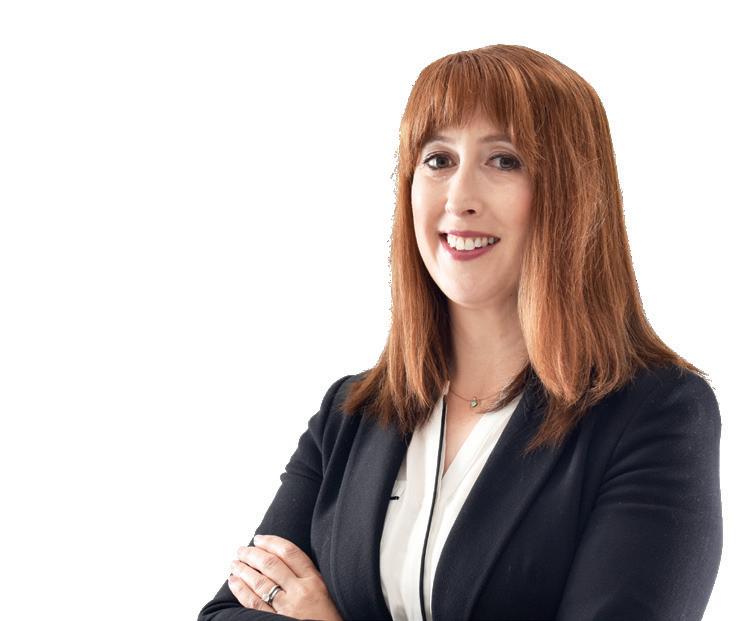

Within the latest rankings, we were delighted to secure another Top Tier position, this time in the Family category, bringing our total number of Top Tier rankings to three, thanks to the Corporate & Commercial and Commercial Property teams retaining their positions from last year.
A number of the firm’s Associates and Partners were also singled out for individual recognition.
Partner, David Low , was singled out as a Next Generation Lawyer in the categories of Commercial Litigation and Property Litigation, indicating the significance of his contribution to these teams and the outstanding client endorsements received.
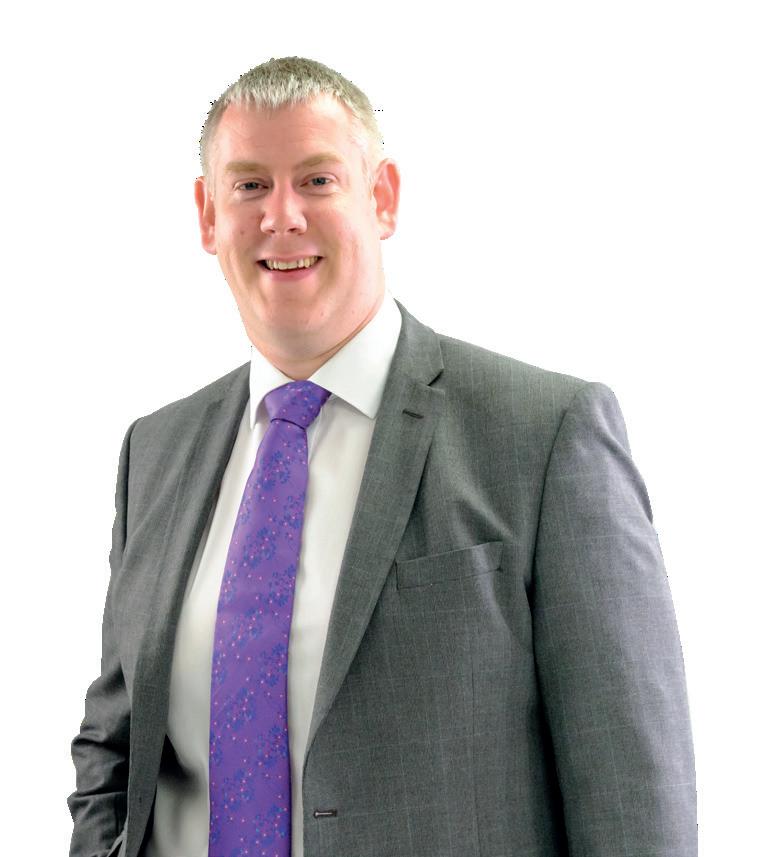


Partners, Martyn Tennant and Victoria Walton , and Head of the Family team, Kath Hill , were acknowledged as Leading Individuals, recognising their experience and leading roles within their respective teams, as well as their wider recognition by market peers.
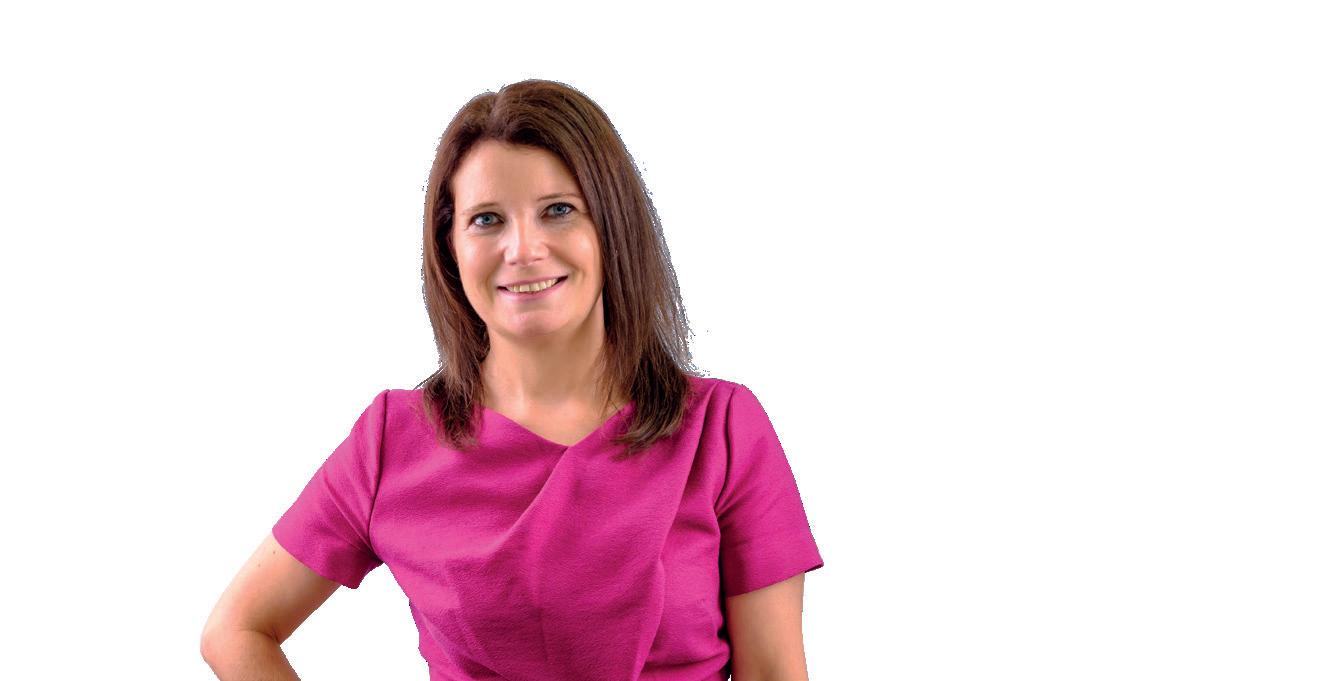
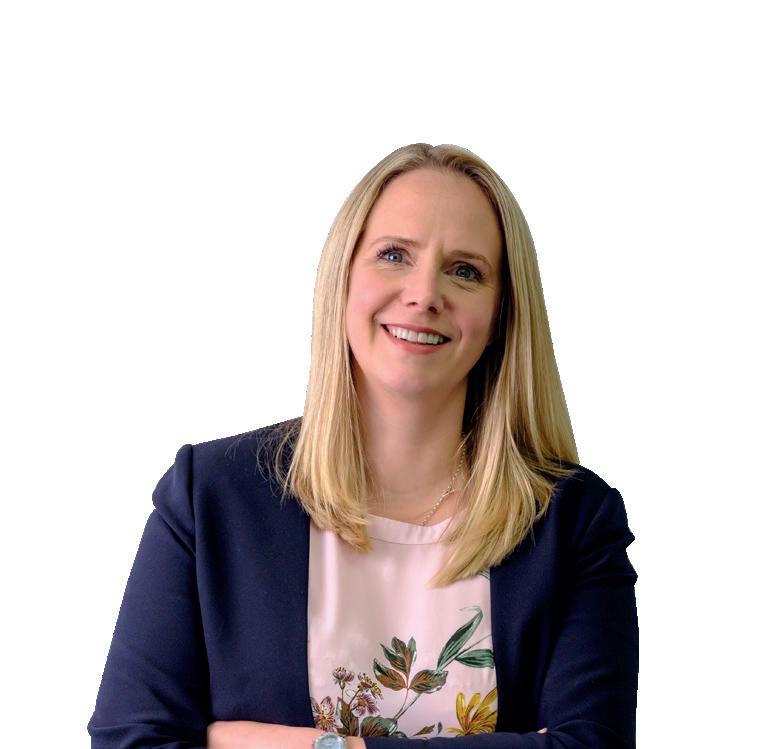
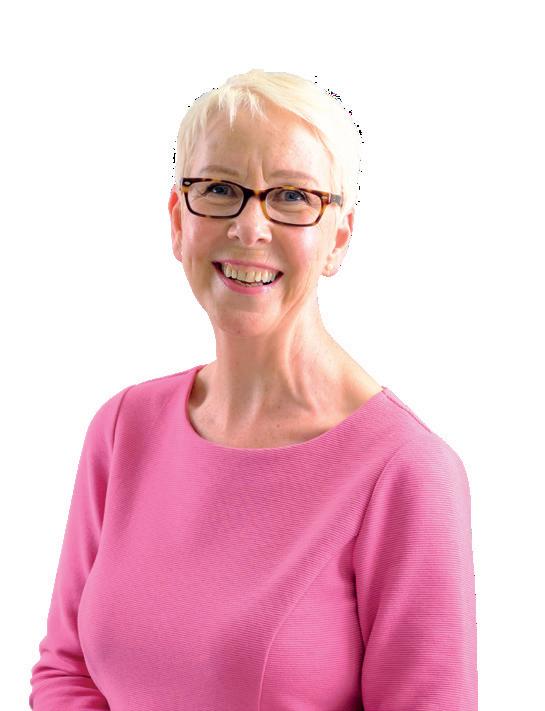
Managing Associates, Abigail Zuk and Gillian Moir, along with Associates, Mike Ward and Natalia Lalas, were named Rising Stars in their respective fields. A great result for the whole firm!

13 swinburnemaddison.co.uk
Continuing to thrive challengingdespitetimes
Whilst the service offering and broad ranging experience of our team have been stress-tested for certain this year, we are delighted to report that we are continuing to thrive even in these challenging times.
Despite what everyone feared might be a downturn resulting from the impact of COVID-19, Swinburne Maddison was able to take swift action, not least because of its committed staff but thanks also to the flexibility of its agile working practices which were already in place prior to March. The result of this is that we have more than maintained our equilibrium, completing a plethora of transactions throughout 2020.
Our proven agility and flexibility have also allowed us to maintain our high standards and levels of service delivery to an expanding client base, resulting in the need to increase the team and create new jobs, including roles for qualified Lawyers in the Corporate, Dispute Resolution and Real Estate teams. We are also looking to develop paralegal roles throughout the firm.
The focus of the recruitment drive is to identify candidates who have demonstrated their tenacity and shared values of putting clients first and who are looking to carve out a long-term career working for one of the leading law firms in the North East.
The successful candidates will be joining a highly motivated team which has received many industry plaudits over the past few years and most recently was ranked in The Legal 500 as one of the region’s top scoring firms for client service in 2020.
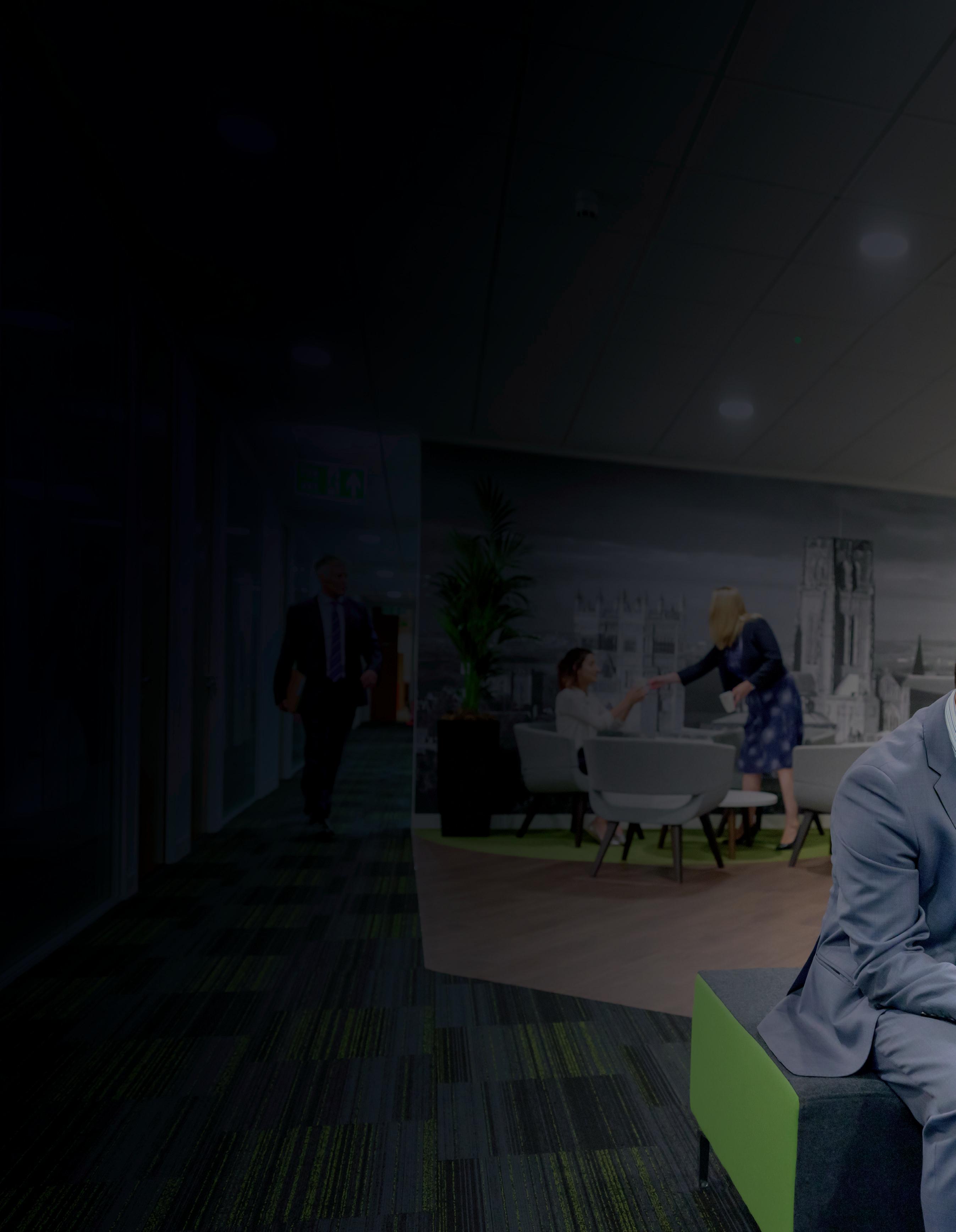
The Legal 500 Client Service Survey is the largest and most comprehensive survey of client satisfaction ever conducted of the UK legal market with more than 150,000 clients contacted to access their views on the service they have received from law firms.
Staying on course to complete deals
The thought of the drastic change to working practices that most businesses would face at the onset of the national lockdown back in March, was daunting for all involved. However, the cohesive approach adopted by every member of staff, each one remaining steadfast and accommodating to do their part, ensured that business at Swinburne Maddison continued as usual.
During the early part of lockdown, our Corporate and Real Estate teams advised clients on one of the largest deals to take place this year in the south of the region which is of a scale and significance that will have a lasting impact on regeneration and sustainable job creation, well into the future.
Deals of this nature are expected to continue and a wide range of business sectors across the north east appear to be enjoying a vibrancy as the region becomes more attractive for businesses to
start up, or relocate to, thanks to its rapidly expanding connectivity, focus on large regeneration schemes and ambitious plans by the local authorities such as Newcastle City Council (to become net zero carbon by 2030) and Durham County Council (who recently gave the County Durham Plan the green light).
Demand from the practice’s longstanding developer clients and the private residential clients continued at pace as the housing market enjoyed continued activity, buoyed by the Chancellor’s decision to put Stamp Duty on hold until March 2021.
Equally, the negative impact of COVID-19 has led to growth in demand for advice from our Litigation and Employment departments seeing the teams working with businesses and individuals alike. With the ongoing impact of the pandemic continuing to take its toll on so many, we expect that this is likely to be the case for some time and our team will continue to work tirelessly to provide timely, practical advice and support wherever it is needed.
The combined effect of all of this according to Partner and Practice Manager, Carolyn Beal, is that there has never been a better time to join the practice and its highly motivated team. She said:
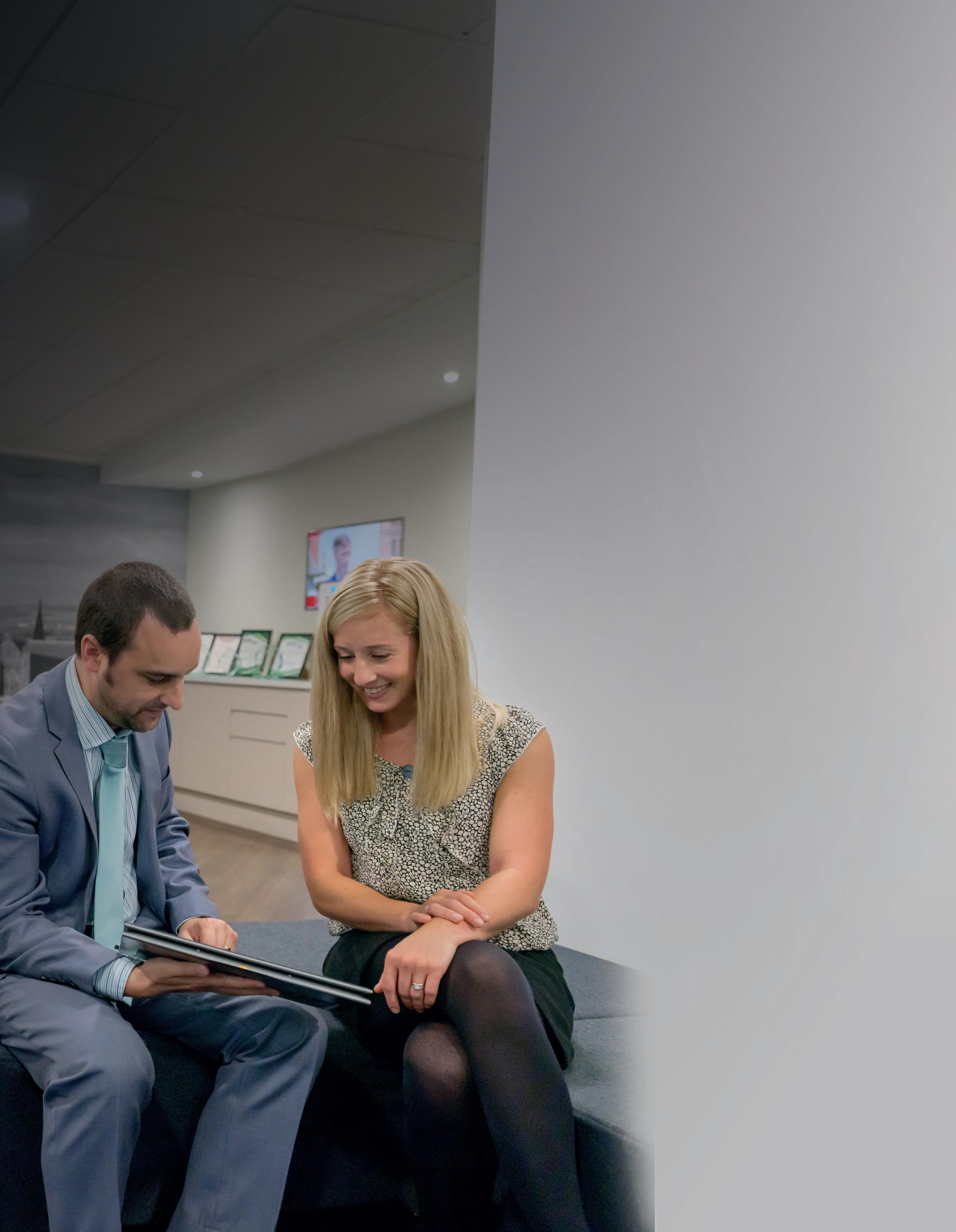
“We remain in uncertain times and are likely to do so for some time but out of adversity comes opportunity and therefore it is more important to us than ever that we show our commitment to our staff and have a strong team of lawyers behind us as we guide our clients through the challenges ahead. We can offer staff a range benefits including access to interesting and varied work with high quality clients as well as exceptional career progression.
Balancing our service offering and ensuring that we have the right depth and breadth of experience within our teams has been stress-tested like never before and it is satisfying to know that our model works. This allows us to continue to compete and stand alongside much larger
Say HELLO!
New arrivals will be joining solicitor, Lewis Brown, who joined the firm in March of last year.


GET TO KNOW OUR FAMILY TEAM
With over 50 years’ combined experience, our Family team have a shared passion for reducing conflict and helping clients to explore alternative approaches to resolving disputes.
Following a recent Top Tier ranking in The Legal 500 UK 2021 edition, the only regional Family team based outside of Newcastle to achieve this, we shine the spotlight on our exceptional Family team.
Lowther
Catherine joined Swinburne Maddison in 2014 and is experienced in all areas of family law, with a particular focus on relationship breakdown and children matters.

Catherine has significant experience dealing with complex, highly-sensitive care proceedings and has recently overseen applications to the Court of Appeal and the High Court in London.
Catherine was also instrumental in setting up our online questionnaire tool which allows prospective new clients to make their initial contact with us – providing a range of in-depth information about their circumstances – through our website.
What would be your number one tip for parents hoping to reduce the impact of divorce on their children?
I don’t know if there is one particular tip that I could single out, but there is certainly one word which I use a lot when talking to parents about this issue and that is “communication”. Keeping an open dialogue with your children and
encouraging them to ask questions and come to you with their worries is such an important part of helping children feel loved and secure throughout the divorce process. It is also a really good way to help your children to identify and process some of the complex emotions they’re experiencing (possibly for the first time).
What aspect of remote working have you found most challenging during lockdown?
Family law is a highly emotive area of work. People are often enduring some of the most difficult times in their lives when they make an initial appointment and we rely on that first face-to-face meeting to break the ice and put our clients at ease. Not being able to see our clients in person during lockdown has been particularly challenging.
Has 2020 taught you any surprising lessons about yourself?
I think 2020 has taught us all to appreciate everything we have a little more, and the freedoms we take for granted….even going into the office!!
16 swinburnemaddison.co.uk
Catherine
Kath Hill Chartered Legal Executive and Head of the Family team
With over 30 years’ experience as a family law advocate, Kath is experienced in all aspects of family law.
Driven by her desire to offer clients an alternative path to dispute resolution wherever possible, and to achieve settlements which meet the needs of both parties and their children, Kath qualified as an accredited Mediator in 1997 and a Collaborative Lawyer in 2008.

This additional specialist training means that Kath and her team are fully equipped to offer clients the full package of dispute resolution options and to help them choose the approach that is right for them.
You have been a Family lawyer for over 30 years now. You must have seen a lot of changes in that time –which one would you say has had the most positive impact?
I’m going to choose something that has really risen in popularity over the course of the pandemic – due to the backlog of cases at Court and the
subsequent delays in receiving hearing dates –and that is the use of Arbitration as an alternative to formal Court proceedings. As well as being quicker and more flexible than Court, it is usually more cost-effective overall. It is certainly a route that I have been encouraging many of my clients to consider this past year, and will continue to do so.
What advice would you give to Family lawyers at the start of their career?
I would recommend that all family lawyers, particularly those just starting out, take the time to fully explore and engage with Alternative Dispute Resolution (ADR). Whether that be formal training in Mediation, Collaborative Law, Arbitration – or simply developing your negotiating skills to make you more effective at narrowing issues prior to any court proceedings – there will always be a place for ADR in Family law.
Where in the world would you most like to visit when we’re free to travel again?
This is an easy one. I have a much-anticipated trip to Thailand already in the diary for next year and I cannot wait! I was due to fly out for a family wedding in March this year but, for obvious reasons, this had to be postponed. I’m sure we’ll make up for it when we finally get there.
Natalia Lalas Associate Solicitor

Natalia joined Swinburne Maddison as an Associate Solicitor in 2019.
She is experienced in all aspects of family law, including divorce, financial claims, children matters and civil partnership dissolution. Natalia also specialises in surrogacy law, helping couples, both in England and abroad, to obtain a legal order following the birth of their child to a surrogate.
As well as practicing as a collaborative lawyer alongside Kath, Natalia is also a Deputy District Judge and is able to represent clients in all courts due to her Higher Rights of Audience.
What qualities are essential to being a good Family lawyer?
Being able to listen is absolutely essential. When people come to you with family problems they are often sharing with you information that they have not disclosed to even their closest family and friends. It’s important to be respectful of the confidence and trust that they put in you by sharing that.
You were appointed a Deputy District Judge in 2019. How has this changed the way you approach your role as a Solicitor?
Working as a deputy judge has been an incredible opportunity to gain more experience in albeit from a slightly different perspective! You have to be able to absorb information quickly and think on your feet whilst at the same time, manage emotions in a court room. This has been a great way to continue to develop my personal and legal skills which I feel has a direct benefit for our clients.
Do you have any tips for managing stress and unwinding at the end of a challenging day?
There is a lot of attention on mental health and well-being at the moment which is very important, particularly in lockdown. I think any exercise, even a gentle walk is hugely beneficial and of course you can’t beat a cuddle with a pet. I’m currently learning about sophrology which is dynamic relaxation so I also recommend that.
17 swinburnemaddison.co.uk
Rebuilding your success in 2021
Legal Health Check
Whilst many business owners are understandably paying a lot of attention to the financial health of their businesses going into 2021, now is also the time to carefully consider any legal arrangements which are in place and to review whether any changes are needed to shore up your business’s position after the events of the last year.
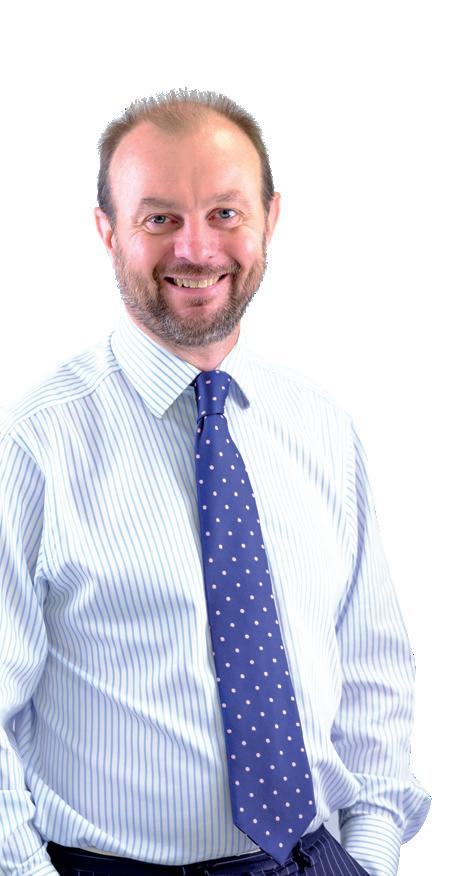


By conducting a thorough legal health check of your business now, it will help to ensure that your business is operating as efficiently as possible and is in the best possible shape to deal with whatever further challenges may lie ahead.
So, as we all take some time to regroup after the events of 2020 – considering the long-term impact of both COVID-19 and Brexit and readjusting strategies where needed – these are just some of the questions which business owners should be asking themselves regarding the legal health of their business:-
What steps can I take to protect my company assets? Do I need to think about restructuring the business to compartmentalise trade risk and protect fixed assets?
Does it make sense for me to merge with or acquire another business to increase my chances of surviving and thriving?
Do I require investment to branch into new sectors and seize new opportunities? How should I balance this between debt and equity?
Is now an appropriate time to consider exit or de-risking my position? What are my succession plans?
Are all of my existing supplier contracts still relevant to my business in the postCovid world? Should I be looking to renegotiate or terminate some of these?
In the event of the worst happening, is my Will up to date in respect of how to deal with my shareholding in my business and all other matters?
Does any adjustment to working patterns mean I have to give specific consideration to Data Protection and GDPR issues?
How can my business cut costs and adapt to the new economic environment? Do I need to consider reducing the size of my workforce? Are there any other steps I can take to avoid the need for redundancies?
Are my contracts of employment and staff handbook fully up to date to accommodate the remote and flexible working that may now be required?
Do I still require physical premises or can the business continue to thrive on a home-working basis? If premises are still required, can these be reduced? What does my current lease allow?
Are all of the necessary credit management systems in place to ensure the business is paid quickly and efficiently? Do I require any assistance recovering outstanding debts which have fallen due?
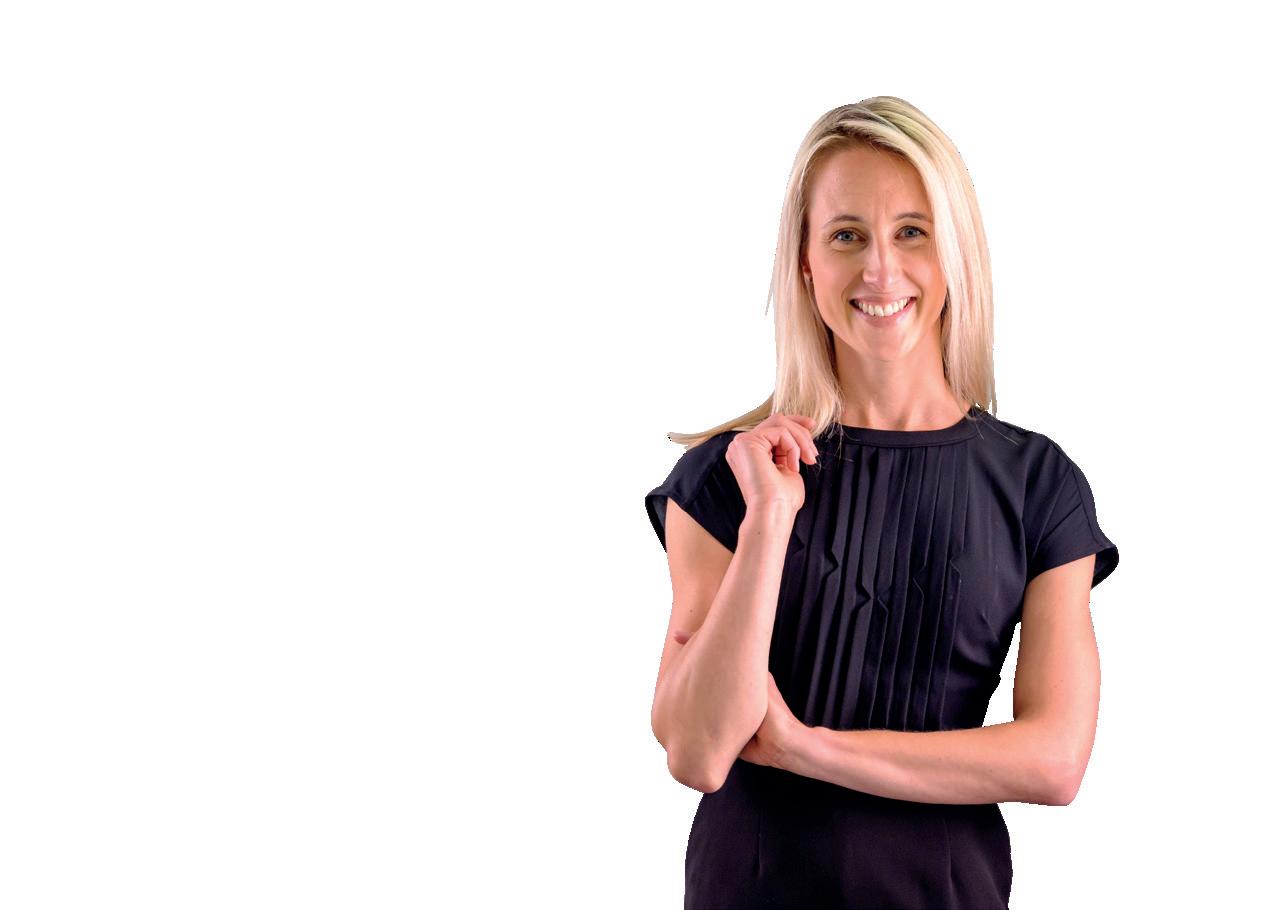
18 swinburnemaddison.co.uk
business for
Bounce Back Tips
Carl Swansbury, Partner and Head of Corporate Finance at Ryecroft Glenton Corporate Finance, shares his top tips for securing the future of your business and coming back stronger in 2021.


1 Plan Carefully and Learn the Lessons
Establish your goals and objectives and define what “success” will mean for your business in terms of bouncing back from the pandemic. Be as specific as possible in identifying the milestones you must reach in order to achieve your goals, then set clear deadlines for reaching each milestone. Try to have at least one contingency plan to help deal with the unexpected so you can revise and update your recovery plan dynamically and as needed.
Consider what opportunities might exist within those sectors that are performing well and that are growing, for example: IT/Tech; Healthcare and Online retail.
Pay attention to how other organisations are responding to and recovering from the pandemic and try to learn from their successes and mistakes.
2 Adapt your Business Model
Many businesses have had to adopt a different approach or to change tack to survive. Professional services is a great example with lots of lessons for the future in terms of remote working, improved efficiency, reduced non-essential travel etc.
What might be the most effective and efficient model for your business in the future, and what does that mean for office space, remote and flexible working, staff morale and tech needs?
Access Funding
Unlike the GFC when there was a significant lack of liquidity, businesses should not be suffering through a lack of funding availability. There are many funding sources available, including: Govt support schemes; Regional funding support like RTC and Jeremie funds; Grants; Banks; Debt funds; and Private equity and VC

4 Manage Cashflow
We all know that “cash is king” in the business world – and never has that been truer than now.
Effective communication with your funders is particularly important in times of such uncertainty. You must anticipate any challenges and proactively address them together with your funders to find solutions. This will give your funders confidence that you are in control and prepared.
A key priority for all businesses at this time should be best practice cash flow management, including a keen focus on working capital, billing, collecting debts and effective cost management.
5 Focus on the Team
Look after your talent. Remember that your employees have been going through an incredibly challenging time too. How you have treated them and will treat them in the next few months will be vital to your long-term success.
Restructuring might be right but is it absolutely necessary and could you be deploying those staff in new strategic areas? How long will it take to recruit and replace any lost staff in the future?
These uncertain times will create opportunities for the recruitment of great talent that might not be otherwise available. Take care not to inadvertently encourage good people towards the exit door.
swinburnemaddison.co.uk
Momentum grows as Open North Foundation supports North East businesses ravaged by COVID-19
2020 was a year none of us will forget, both professionally and personally. A country beset by one of the highest COVID infection rates in Europe and a business community left in shock as a series of lockdowns and restrictions impacted national and global commerce to a degree that we have not witnessed in our lifetime.
For many businesses, it was a fight for survival, as it continues to be.
Open North Foundation was established in July 2020 with the aim of assisting the businesses and people of the North East to recover from the devastating impact of COVID-19.
Thanks to the ongoing support from their Ambassadors – including Swinburne Maddison Partner, Jonathan Moreland –and backing from supporters in the wider North East business community, significant funds have already been raised together with offers of in-kind support such as marketing, HR, legal and accountancy, all of which is administered via Open North Foundation. A significant number of support packages have been received by successful applicants, the earliest recipients being businesses in health and fitness and creative branding and marketing.
Whilst the immediate aim is to provide financial support, the longer-term goal
is to provide technical support, business advice and consultancy to enterprises and individuals adversely affected by the pandemic.
In December, Open North Foundation announced its strategic partnership with Northumbria University, Newcastle. This will allow pandemic-hit businesses access to tens of thousands of pounds of support and the opportunity to utilise a range of resources, expertise and free consultancy services from the University.

Northumbria’s Newcastle Business School, the only North East business school accredited by the Small Business Charter, is offering places to those qualifying grant applicants on its Small Business Leadership Programme – a free 10-week strategic training programme for senior leaders in SMEs (those employing between 5-249 employees). Funded by The Dept. for Business Energy Industrial Strategy, the
programme covers a range of practical topics and is hosted online by SME experts, including entrepreneurs, business leaders and academics from Newcastle Business School.
In addition, the University most generously donated £10,000 for direct grant donations.

For many businesses, the challenges are set to continue into 2021, as the government withdraws its furlough scheme and the reality of Brexit hits a region that has one of the highest rates of export in the UK and relies heavily on EU imports for our strong manufacturing and automotive sectors. The true impact of what our resourceful region is to face is one we cannot predict and that is why we see Open North Foundation playing such an important role.
If you would like to support the Open North Foundation, please visit their website: www.opennorthfoundation.co.uk
20 swinburnemaddison.co.uk
L-R Dr Hannah Hesselgreaves (Northumbria University), Vince Robson (Northumbria University), Dr Matt Sutherland (Northumbria University), Colin Hewitt (Open North Foundation) and Richard Swart (Open North Foundation)
Rent arrears in the age of Covid – Where things stand for commercial landlords
The effect of the COVID-19 pandemic on the UK commercial property market has been profound, with retail and hospitality sectors being hit particularly hard. The government’s focus has primarily been on “protecting viable businesses” with new legislation being rolled out at an unprecedented rate to ensure that tenants receive the breathing space they need to make it through.
For businesses which were required to close for extended periods throughout 2020, these dispensations have been critical to their survival.
For the landlords of those businesses, many of whom have been unable to recover rent arrears for almost a full year now, it has been a period of great uncertainty and financial strain.
We thought it would be useful to provide a round-up of all the changes which have been introduced over the past year and to clarify the current position for commercial landlords as we settle into 2021.
When considering any of the options outlined in this article, landlords should always keep in mind the government’s commercial property code of practice, which was introduced in June 2020 to encourage parties to take a “unified approach” in resolving disputes and to act “reasonably and responsibly” at all times.

Current Restrictions
Forfeiture
The government has twice extended restrictions on the ability of landlords to recover commercial rent arrears from tenants – it is now due to expire on 31st March 2021. The Coronavirus Act 2020 prevents
any forfeiture before this date for non-payment of any sum due under the lease.
It is important to remember that those sums will continue to remain due by tenants (together with accrued interest, if the terms of the lease allow) and only an express waiver will remove the right to forfeit when the restricted period ends.
Commercial Rent Arrears Recovery (CRAR)
Prior to 2020, the rule for using CRAR was that there should be more than 7 days’ rent outstanding. However, pursuant to regulations introduced in response to the pandemic, this period has been increased several times to provide added protection to tenants during lockdown. As of 25th December, landlords may not use CRAR unless at least 366 days’ rent is due. This restriction applies until 31st March 2021.
Statutory demands and winding-up
The Corporate Insolvency and Governance Act prohibits landlords from issuing a winding-up petition based on a statutory demand served between 1st March 2020 and 31st March 2021.
It is however possible to present a winding up petition during this period
if it can be shown that COVID-19 has not worsened the debtor’s financial position or the debtor could not have paid its debts even if there had been no Covid-related worsening of its financial position.
Remedies which may be available
Recovery of rent from other parties
Subject to the terms of the lease, it may be possible for a landlord to recover unpaid rents from former tenants and guarantors, existing guarantors or subtenants of the premises. The specific wording of the lease documentation would need to be checked carefully to determine whether liability has been triggered.
Rent deposits
The aforementioned government Code of Practice acknowledges that landlords can draw on rent deposits if required, but advises that landlords should not require tenants to top up deposits “before it is realistic and reasonable to do so.”
Debt recovery proceedings
There are currently no restrictions on landlords issuing claims under Part 7 or Part 8 of the Civil Procedure Rules to recover rent arrears from tenants, although in practice it may be difficult to enforce any judgment received given the current restrictions in place on bailiffs entering properties and on winding-up petitions.
21 swinburnemaddison.co.uk
An interview with JOHN ADAMSON, RAMSIDE HALL ESTATES
In 2019, John Adamson, one of the north east’s leading hospitality sector entrepreneurs and a longstanding client of Swinburne Maddison, was one of Prism’s first guest interviews. Now, living in a very different and somewhat surreal world, John kindly agreed to do a follow up interview with us. In a more sombre mood, here’s what he had to say.
Since we last met, what investments have you made to your portfolio?
One thing we have done, is introduce luxury treehouses in the grounds of Ramside Hall overlooking the 18th fairway of the Prince Bishops course and they have been tremendously well received. The plan is to build morehowever, start on site is likely be delayed now due to the current climate.
Can you sum up how the pandemic has affected your business?
It’s been catastrophic! Year-on-year takings are down by 80% and the cost to the business is millions, which we will never get back.
I’m frustrated at the government, in part, closing the sector down en masse and tarring the entire hospitality sector with the same brush. I understand their concerns around nightclubs and pubs because alcohol is involved, and people lose their inhibitions singing /dancing etc.
Restaurants on the other hand can and did make premises covid-safe and enjoyable for customers, which was proved possible during August’s ‘Eat Out to Help Out’ scheme. Now, they are restricted to takeaway only and aren’t allowed to sell alcohol.
After the lift during the summer, with the further restrictions and tiering the business hasn’t taken a penny since 1st November. Even though the furlough is in place, which has been a godsend, there
are still significant ongoing running costs to cover such as NI, business insurance and software licenses, not to mention cutting the grass on the golf courses, and general maintenance of each venue to ensure we are ready to reopen the minute we can.
How did your business adapt in 2020?
We didn’t! We weren’t really given the chance to because the sector has effectively been closed for much of it and sadly remains closed for the foreseeable. So far, the cost to the business in lost sales is £23million. I believe with good COVID-19 safety measures in place we could have and should have stayed open! We proved this in July and August.
You have invested significantly to both extend and raise the quality of accommodation and guest experience that you offer. Given the problems with foreign travel during the pandemic and possible knock-on effect of Brexit, do you hope to benefit from this?
Most customers come from the north east, but in the summer, when we could move around again, I was amazed by the number of guests who had travelled the breadth of the UK to stay with us.
In the past five years the range and standard of accommodation facilities have improved and diversified immensely.
Who’d have thought people would want to stay in tree houses, lodges, yurts, converted buses and the like, but they do because it’s a bit different and they have all the home comforts. So, yes,
22 swinburnemaddison.co.uk
I believe the staycation market is going to grow and I’m pinning a lot of hope on that being the case; so much so, that we have plans in place to add 20 lodges and tree houses at Ramside Hall and revamp the golf course as well as adding golf simulators. I’m also looking at introducing a bowling alley and other outdoor activities that families can enjoy, making it very appealing to stay.
There is a lot of development going on in the region now, for example the Milburngate scheme and mixed-use development at Gateshead Quays. How will your business benefit from this?
As you know, I’m pro development and these schemes are going to be very beneficial not just for my business but the whole of the North East. The ripple effect will be that new businesses will locate to the region and they will bring business travellers. More large events such as concerts will take place and we will be on hand to provide first-class hotel and leisure accommodation for the visitors they will attract.

I remain committed to investing in the business and the region and have recently worked with the Swinburne Maddison team on the acquisition of a building in Durham city centre, which I intend to convert into high quality serviced apartments. I also intend to submit a planning application for further development at both Ramside and Hardwick Hall. Difficult though it is now, I am trying to remain positive, but I do think things will get worse before they get better.
What do you think life will look like for your business and the wider hospitality sector post-pandemic?
It’s going to take a while for it to resemble any sort of normal. I think the restaurant and staycation customers will be the first to come back in any numbers but as for larger events such as festivals, annual dinners, and weddings, they are likely to take much longer, perhaps even one to two years because of a lack of confidence from the public and
When we last spoke it was clear that you value enormously the team you have built and the contribution they make to your business. What are your future hopes for you and your team?
I do have a great team and thanks to the government’s brilliant furlough scheme I have managed to keep the staff on board. They have also shown their commitment
swinburnemaddison.co.uk
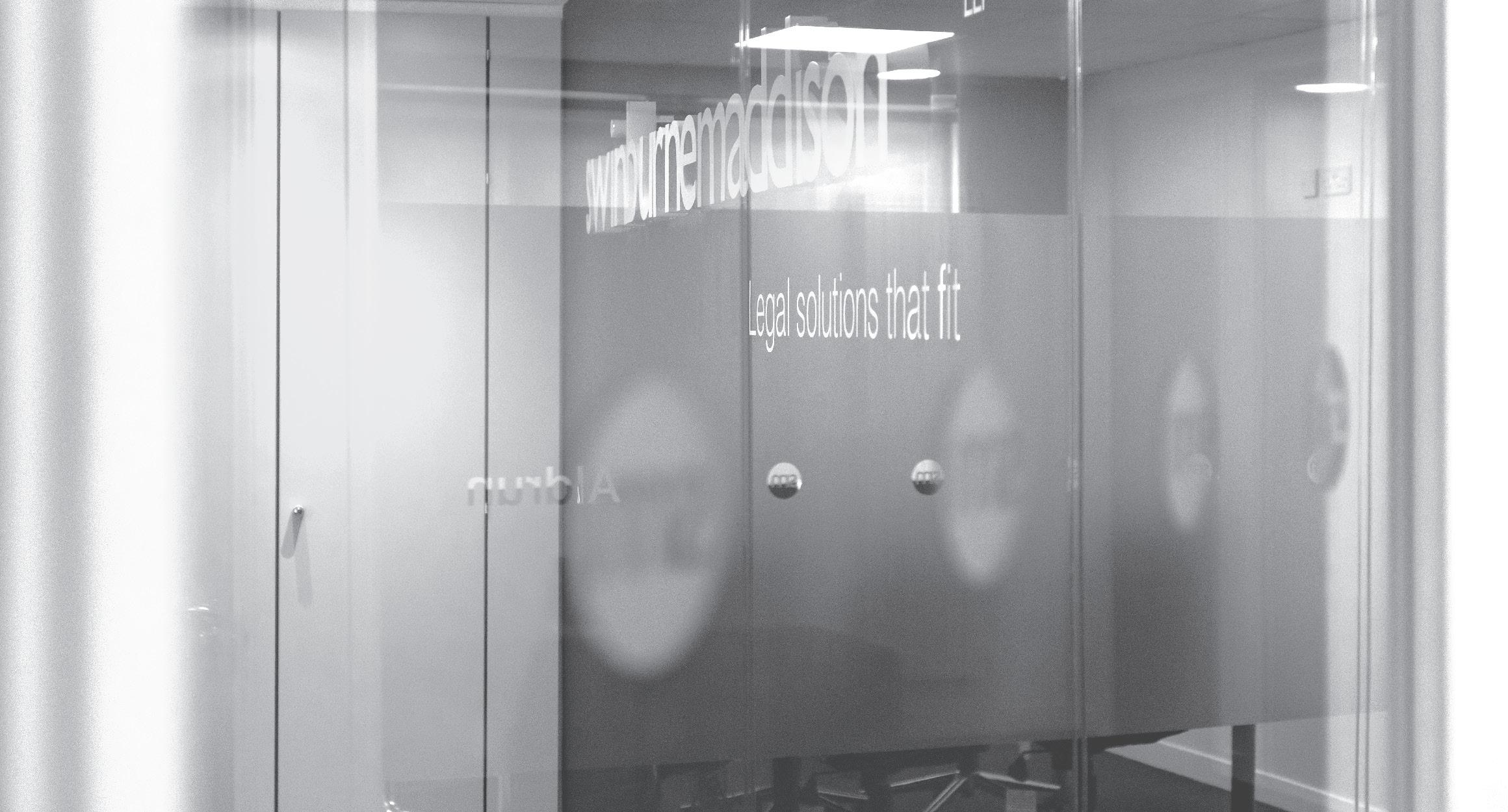 Aykley Heads, Durham Tel: 0191 384 2441 swinburnemaddison.co.uk
Aykley Heads, Durham Tel: 0191 384 2441 swinburnemaddison.co.uk



















































 Aykley Heads, Durham Tel: 0191 384 2441 swinburnemaddison.co.uk
Aykley Heads, Durham Tel: 0191 384 2441 swinburnemaddison.co.uk